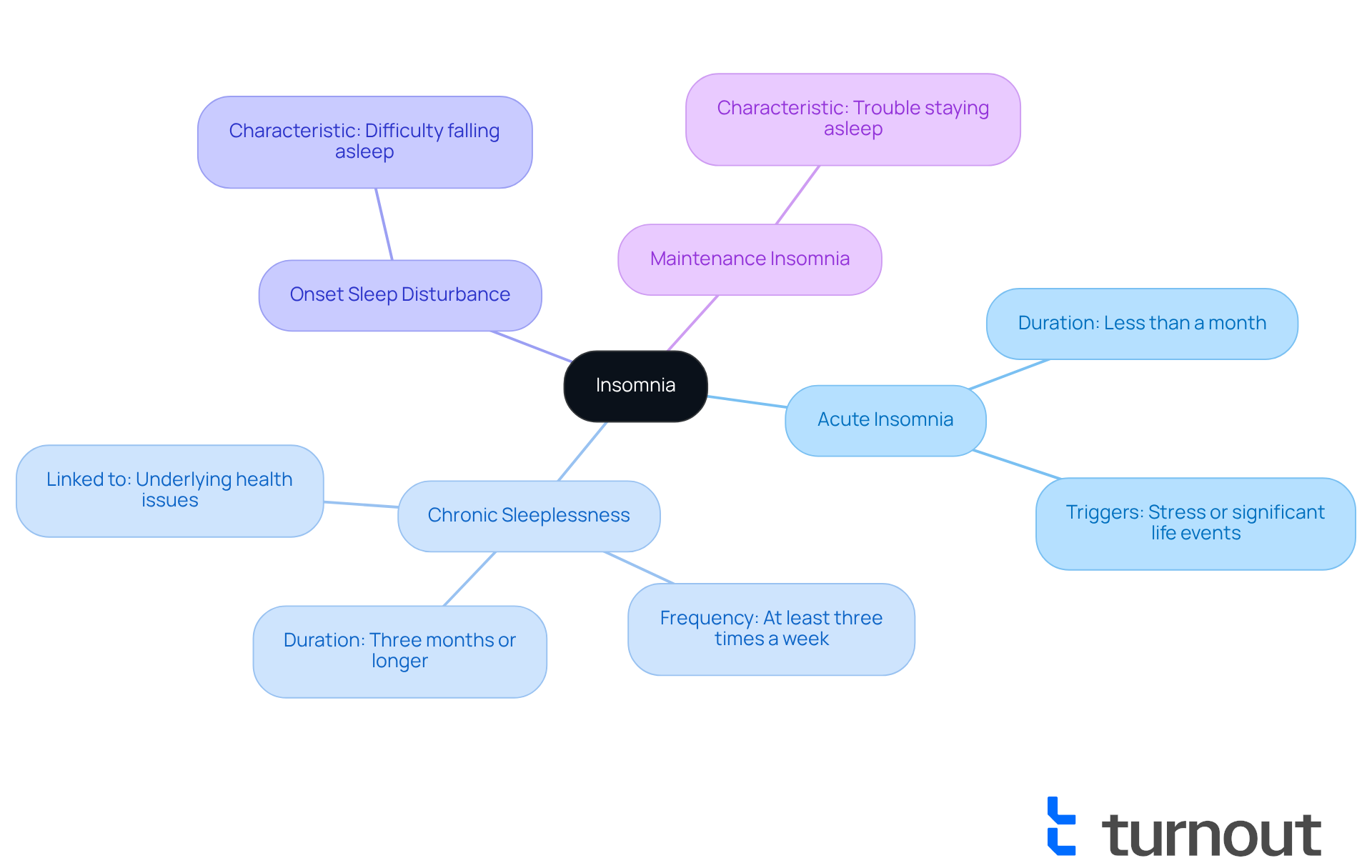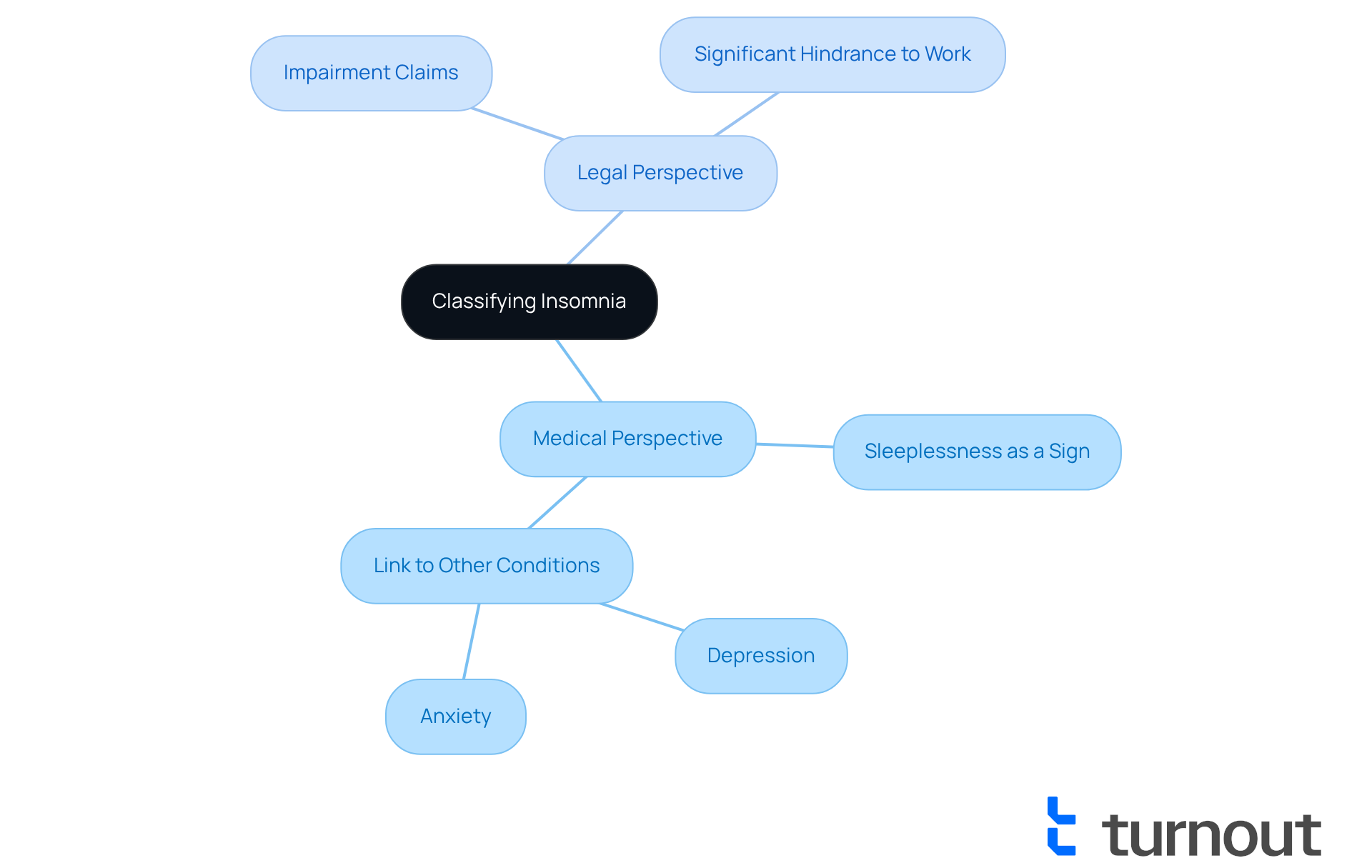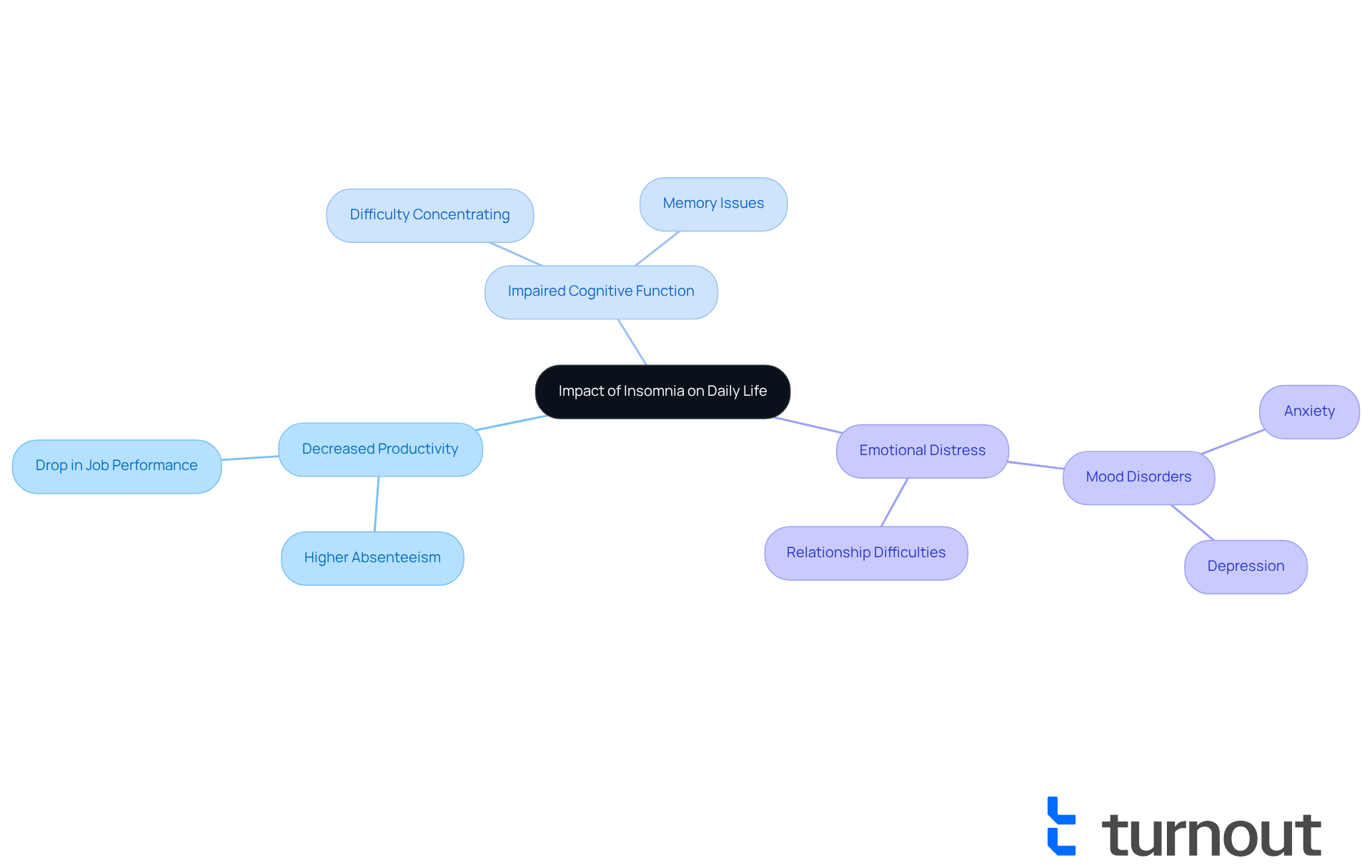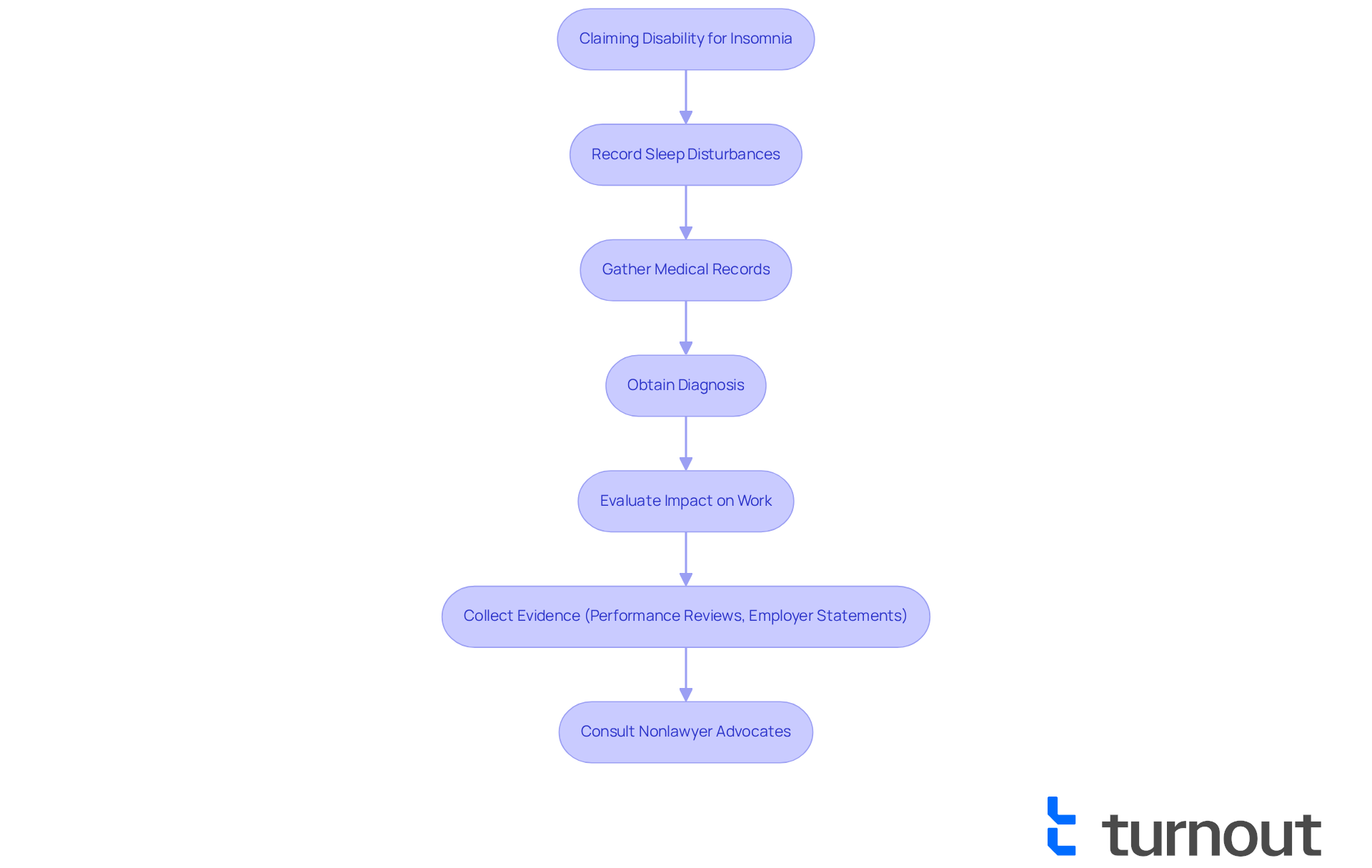Overview
Insomnia can feel overwhelming, especially when it significantly affects your ability to work or manage daily tasks. If you’re also dealing with conditions like anxiety or depression, it’s understandable to feel concerned about your situation. While the Social Security Administration typically doesn't classify insomnia as a standalone disability, it’s important to know that it can be recognized within broader impairment claims.
We understand that documenting the impact of insomnia on your daily life and work performance is crucial. By doing so, you can help paint a clearer picture of your struggles. Remember, you are not alone in this journey, and there are resources available to support you. We're here to help you navigate these challenges and find the assistance you deserve.
Introduction
Understanding the complexities of insomnia is essential in today's world, where sleeplessness affects countless individuals. We recognize that this pervasive sleep disorder can disrupt daily life, leading to decreased productivity and emotional distress. This raises a critical question: does insomnia qualify as a disability?
As you navigate the intricate landscape of disability benefits, this article delves into the medical and legal perspectives surrounding insomnia. It offers insights on how this condition impacts daily functioning and outlines the steps necessary for claiming disability.
What challenges do you face when seeking recognition and support for your condition? You're not alone in this journey, and we're here to help you understand your options.
Define Insomnia: Symptoms and Types
A sleep disorder can be a challenging experience, often marked by difficulties in initiating sleep, maintaining it, or waking up too soon, leading to non-restorative sleep. If you’ve been feeling fatigued, irritable, or having trouble concentrating, you’re not alone. Understanding the different types of insomnia can be a crucial step towards finding relief:
- Acute Insomnia: This short-term insomnia lasts less than a month and is often triggered by stress or significant life events.
- Chronic Sleeplessness: If you find yourself struggling to sleep at least three times a week for three months or longer, this may be linked to underlying health issues.
- Onset Sleep Disturbance: This refers to the difficulty of falling asleep at the beginning of the night.
- Maintenance Insomnia: This is characterized by trouble staying asleep throughout the night.
Comprehending these categories is vital for recognizing how sleep disturbances, including the question of is insomnia a disability, can impact your overall well-being and performance. Remember, we're here to help you navigate through these challenges. You are not alone in this journey.

Classify Insomnia: Legal and Medical Perspectives
From a medical perspective, we understand that sleeplessness is often seen as a sign rather than an independent impairment. It's common to feel overwhelmed by this issue, especially when navigating the complexities of health and well-being. The Social Security Administration (SSA) generally does not categorize sleeplessness as a standalone condition unless it is linked with another qualifying issue, such as depression or anxiety, which leads to the question: is insomnia a disability?
However, it’s important to know that legally, there are considerations regarding whether insomnia is a disability that may be acknowledged in impairment claims if it significantly hinders your ability to work or carry out everyday tasks. For instance, if sleeplessness arises as a secondary issue from a primary impairment, it could be considered within the framework of a more comprehensive claim.
Understanding these categories is essential for individuals seeking to maneuver through the intricacies of disability benefits related to sleep disorders and determining if insomnia is a disability. Remember, you are not alone in this journey, and we’re here to help you find the support you need.

Assess Impact: How Insomnia Affects Daily Life
Insomnia can deeply impact your daily life. You might find yourself struggling with:
- Decreased productivity
- Impaired cognitive function
- Emotional distress
We understand that sleeplessness can make it difficult to concentrate at work, leading to higher absenteeism and a drop in job performance.
It's common to feel overwhelmed by the challenges that come with sleep disturbances. These issues are often linked to mood disorders like anxiety and depression, making it even harder to function effectively. The combined effects of sleep deprivation can create significant difficulties in your personal relationships and overall quality of life.
Recognizing these impacts is crucial. Addressing sleep issues is an essential step in understanding whether insomnia is a disability when assessing claims for impairment. Remember, you are not alone in this journey. We're here to help you find the support you need.

Navigate Benefits: Claiming Disability for Insomnia
Obtaining disability benefits for sleep disorders can feel overwhelming, but you are not alone in this journey. First, it's important to record your sleep disturbances and how they impact your daily life. This may involve gathering medical records and obtaining a diagnosis from a healthcare provider that links your sleep issues to another qualifying condition.
Next, consider whether insomnia is a disability that affects your work performance. Collect evidence such as:
- Performance reviews
- Statements from your employers that highlight these challenges
We understand that this can be a difficult process, and that's why consulting with trained nonlawyer advocates at Turnout can be incredibly helpful. They specialize in disability claims and can guide you to ensure that all necessary documentation is complete and accurate.
While Turnout is not a law firm and does not provide legal advice, their supportive approach to assisting with SSD claims can significantly improve your chances of a successful outcome. Remember, you are taking an important step towards getting the help you need, and we’re here to support you every step of the way.

Conclusion
Insomnia presents significant challenges that can deeply affect not only sleep but also overall quality of life. We understand that recognizing insomnia as a potential disability requires an awareness of its various types, symptoms, and the impact it has on daily functioning. This article has explored how insomnia can be classified through both medical and legal lenses, emphasizing that while it may not always be recognized as a standalone disability, its effects can be profound when linked to other qualifying conditions.
Key insights have been shared regarding the ramifications of insomnia on productivity, cognitive function, and emotional well-being. It's common to feel overwhelmed by sleep disturbances and their implications for work performance, as these factors play a crucial role in determining eligibility for disability benefits. Additionally, the article underscores the value of seeking support from advocates who can assist in navigating the complexities of the disability claim process.
Addressing insomnia is not merely about seeking rest; it is about reclaiming one's life and functionality. For those grappling with the effects of sleeplessness, understanding its classification and impact can empower you to pursue the necessary support and benefits. Taking proactive steps towards managing insomnia can lead to improved health outcomes and a better quality of life. Remember, you are not alone in this journey—reinforcing the importance of addressing this often-overlooked condition can make a significant difference.
Frequently Asked Questions
What is insomnia?
Insomnia is a sleep disorder characterized by difficulties in initiating sleep, maintaining sleep, or waking up too soon, resulting in non-restorative sleep.
What are the common symptoms of insomnia?
Common symptoms of insomnia include fatigue, irritability, and trouble concentrating.
What is acute insomnia?
Acute insomnia is a short-term form of insomnia that lasts less than a month, often triggered by stress or significant life events.
What is chronic sleeplessness?
Chronic sleeplessness refers to difficulty sleeping at least three times a week for three months or longer, which may be linked to underlying health issues.
What is onset sleep disturbance?
Onset sleep disturbance is the difficulty of falling asleep at the beginning of the night.
What is maintenance insomnia?
Maintenance insomnia is characterized by trouble staying asleep throughout the night.
How can understanding insomnia types help?
Understanding the different types of insomnia can be crucial for recognizing how sleep disturbances impact overall well-being and performance, aiding in finding appropriate relief.




